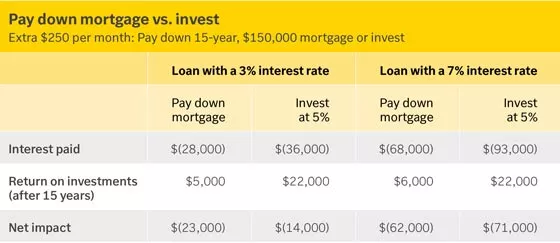Is paying off your mortgage early the right move?

If you’re a homeowner, the idea of paying down or paying off your mortgage early can be an appealing one. The thought of eliminating monthly payments, building your home equity and saving on interest can make mortgage prepayment seem like a smart financial move. But while it may be tempting to put extra cash toward paying down that debt, it may not always make the most financial sense. With interest rates, market conditions and personal financial goals to consider, directing those extra funds elsewhere — such as building your financial stability or into investments with higher potential returns — may sometimes be the smarter long-term move.
Before you make additional mortgage payments, ask yourself these three questions:
1. Do I have high-interest debt? Mortgages generally have relatively low interest rates compared to other kinds of debt. So, you’ll typically be better off paying down high-interest debt (such as credit card debt) first before attempting to put more equity into your home.
2. Do I have enough emergency savings? In general, we recommend having three to six months' worth of expenses in an emergency fund to help get you through a potential job loss or pay for unexpected expenses (like home repairs or medical emergencies). Since not having enough savings can lead to more debt or selling investments after an emergency, consider making progress toward building your emergency fund before making extra mortgage payments.
3. Am I saving enough for retirement? Before making any extra payments toward your mortgage, make sure you’re taking full advantage of any employer match for retirement plans and health savings accounts (HSAs) available to you. An employer match is a powerful tool for saving, and you can’t recoup lost years, so make sure to prioritize those opportunities.
If you have the above items covered, the next step is to consider whether it makes more sense to put your next dollar toward paying down your debt or make progress toward your other financial goals. Remember, every dollar used to pay down debt is a dollar you won’t be able to save.
Know your mortgage debt
Before making any decision, make sure you know the nuts and bolts of your loan. Among other features, understand:
- Total amount owed
- Interest rate charged and type (fixed versus variable)
- Whom you owe
- Monthly payment and payoff date
- If your loan has a prepayment penalty
Decide how much to allocate to your mortgage versus other goals
Once you understand your mortgage, determine how much extra money you have to put toward your monthly payments. Start by going over your budget and calculating any surplus available after covering your total expenses. If you have extra funds to pay off your mortgage early, assess how best to deploy these funds. Paying off debt can save you on interest charges — but at the cost of missing out on investing the money and potentially earning a market return that could be higher than the rate on your debt.
The following chart shows an example of the financial trade-off between paying down your loan versus investing. As you can see, if the interest rate on your mortgage is lower than the expected market return, it would be more financially advantageous to allocate extra payments toward investing rather than to your loan (and vice versa).

The chart shows an example of the financial trade-off between paying down your loan versus investing. If the interest rate on your mortgage is lower than the expected market return, it would be beneficial to allocate extra payments toward investing rather than to your loan (and vice versa).

The chart shows an example of the financial trade-off between paying down your loan versus investing. If the interest rate on your mortgage is lower than the expected market return, it would be beneficial to allocate extra payments toward investing rather than to your loan (and vice versa).
What about refinancing?
Refinancing generally makes sense if you can get a rate that’s lower than the current rate on your loan. And not just lower, but low enough to compensate for the costs and fees of refinancing — according to Fannie Mae, between 2% and 5% of the amount of the new loan. But with current mortgages rates hovering over 6%1 and most homeowners locked into a rate below 5%,2 refinancing is probably not worth it for most people. Keep in mind that, while refinancing might not make sense for you now, it might in the future if market conditions change.
Weigh your mortgage prepayment options
Whether paying down your mortgage is the right move depends on several factors. In many cases, strategically allocating extra cash elsewhere can be the smarter choice. Before making any decisions, consult with your Edward Jones financial advisor to ensure you understand your options and the potential impacts on your financial future.
Important information:
1 "30-Year Fixed Rate Mortgage Average in the United States," Federal Reserve Bank of St. Louis.
2 "Redfin Reports 17% of Homeowners With Mortgages Have an Interest Rate of at Least 6%, the Highest Share in Nearly a Decade," Morningstar.